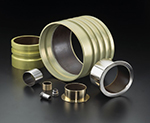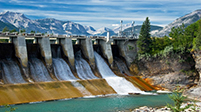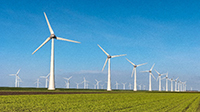At RBC we know that caring about our impact on the environment and society and how we govern our company are essential to generating long-term value for RBC and our stakeholders, and we are constantly looking for ways to improve our performance in all three areas.
Our Products
We are in the business of tribology – the science and engineering of interacting surfaces in relative motion, which includes the study and application of the principles of friction, lubrication and wear. Friction and wear are the enemies of energy efficiency and longevity for all types of vehicles, aircraft and mechanical devices.
Our mission is to develop and produce innovative products that reduce friction and wear in our customers’ products to the lowest level possible, thereby making those products more efficient and longer lasting. This enables the users of our products to further their sustainability efforts by both reducing their consumption of petroleum-based lubricants and fossil fuels, thereby reducing resulting greenhouse gas emissions, and reducing maintenance processes that can adversely affect the environment.
 We offer fabric-based molded liner systems that utilize self-lubricating particles that eliminate the need for petroleum-based lubricants. These liner systems are designed to have lower friction levels than conventional greased metal-to-metal bearings and require less energy to actuate, which improves the efficiency of the device in which they are incorporated, whether that be an aircraft or a bulldozer. The move from greased bearings to self-lubricating, maintenance-free bearings prevents the release of substantial amounts of grease pollution into the environment each year.
We offer fabric-based molded liner systems that utilize self-lubricating particles that eliminate the need for petroleum-based lubricants. These liner systems are designed to have lower friction levels than conventional greased metal-to-metal bearings and require less energy to actuate, which improves the efficiency of the device in which they are incorporated, whether that be an aircraft or a bulldozer. The move from greased bearings to self-lubricating, maintenance-free bearings prevents the release of substantial amounts of grease pollution into the environment each year.
We work to reduce the weight of our products that are used in applications where a weight savings translates to a fuel savings. As the bearing is made smaller, then the bearing housing and bearing actuator can be made smaller, leading to a reduction in the weight of the total system.
 We provide proprietary ducting solutions for commercial aircraft gas turbine engines, which function more efficiently through a wider dynamic range than ducting from other sources, and are consequently more durable than other ducting. These qualities enhance the fuel efficiency of the aircraft engine and lead to a significant reduction in the maintenance that the engine operator has to perform.
We provide proprietary ducting solutions for commercial aircraft gas turbine engines, which function more efficiently through a wider dynamic range than ducting from other sources, and are consequently more durable than other ducting. These qualities enhance the fuel efficiency of the aircraft engine and lead to a significant reduction in the maintenance that the engine operator has to perform.
We are helping to increase the generation of electricity from renewable sources by providing products to the hydroelectric industry, as well as components for wind turbines.


Our Processes
Our production processes are designed to be as efficient as possible to minimize our consumption of raw materials, utilities (electricity, water, gas) and other resources. Nevertheless, we are always exploring ways in which we can enhance efficiency. We recognize that reducing our consumption of resources, including energy, is both good for our business and good for the environment. Our efforts in this area include upgrading various equipment to newer more energy-efficient models and installing energy-efficient lighting throughout our operations.
 Scrap metal from production is unavoidable but we take steps to minimize the amount of scrap as much as possible, and all scrap metal is recycled so that none of it is thrown away. In addition, we continuously pursue ways to reduce our generation of other waste materials and to maximize the recycling of those materials.
Scrap metal from production is unavoidable but we take steps to minimize the amount of scrap as much as possible, and all scrap metal is recycled so that none of it is thrown away. In addition, we continuously pursue ways to reduce our generation of other waste materials and to maximize the recycling of those materials.
 RBC is always working to reduce the impact of our operations on the environment. For example, some of our products have historically incorporated a chrome or cadmium coating in order to meet hardness, corrosion resistance, or other performance specifications. But the chrome and cadmium coating processes require the use of hazardous materials, so we have developed alternative coating processes that are more environmentally friendly and we are working to integrate those new processes into more of our product offering.
RBC is always working to reduce the impact of our operations on the environment. For example, some of our products have historically incorporated a chrome or cadmium coating in order to meet hardness, corrosion resistance, or other performance specifications. But the chrome and cadmium coating processes require the use of hazardous materials, so we have developed alternative coating processes that are more environmentally friendly and we are working to integrate those new processes into more of our product offering.
The coolant/lubricant systems used in the majority of our manufacturing processes are closed loop systems in which the water-based coolant/lubricant is retained and reused, thereby significantly extending the life of the coolant/lubricant and reducing our consumption of new coolant/lubricant.
We have significantly reduced the use of VOC-based solvents or cleaners, our air and water emissions do not require special treatment or permitting, and we generate relatively small amounts of hazardous wastes. To keep our employees, local communities and the environment safe, RBC follows stringent waste management processes to ensure that all hazardous wastes are disposed of in accordance with all applicable environmental guidelines and requirements. In the last 20 years RBC’s operations have not produced an environmental condition that has required remediation.

 Shop Now!
Shop Now!